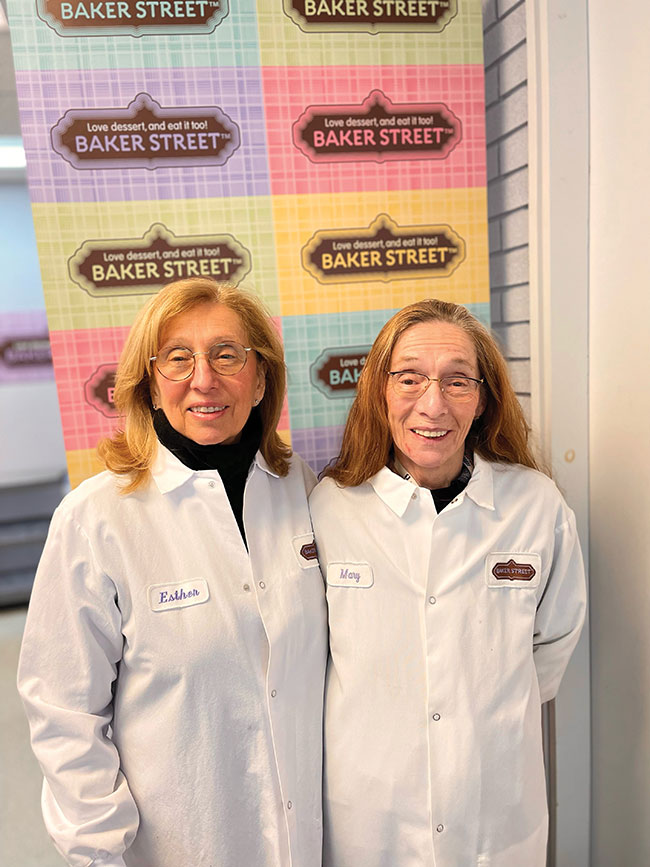
Roadmap to succession
April 4, 2022
By
Colleen Cross
Baker Street’s tradition of quality desserts has bright future with strong second generation
 Baker Street is the brainchild of sisters Esther Kravice and Mary Somerton. PHOTO: BAKER STREET
Baker Street is the brainchild of sisters Esther Kravice and Mary Somerton. PHOTO: BAKER STREET Not every successful bakery business is able to carry on to the next generation. For those who manage the transition, the sweet reward is knowing your company is continuing the values on which it was founded.
Toronto-based wholesale dessert supplier Baker Street has pulled this off by building a unique management structure headed up by family members who are passionate about their product and service.
Mary Somerton and Esther Kravice are co-CEOs of the highly successful dessert company they incorporated in 1978. Baker Street produces premium cakes, cheesecakes and tortes made by hand using high-quality ingredients. The desserts are available at restaurants, cafés, hotels, country clubs and grocery stores in Canada.
Together they started the company and share the responsibilities of leading and operating it. Over the years they have built a unique family-led management structure designed to carry on making delicious desserts like their velvet cake, strawberry shortcake, crème brûlée cheesecake and award-winning carrot cake.
Before we talk about their bold, effective family succession plan, let’s learn more about the roots of Baker Street.
“When we first started, we noticed there was a growing market in desserts, and Mary and I always used to enjoy baking and coming up with our own desserts,” Kravice says. “We showed them to a couple of restaurants and, to be honest, word spread.”
“We made all our own ingredients – our own caramel, our own ganache,” Somerton points out. “We were doing carrot cake, chocolate cake, cheesecake, pies, flans, mixed fruit.”
They expanded in the 1990s to supply grocery chains such as Metro, Loblaws, Sobeys, Longo’s, M&M and Pusateri’s and smaller independent grocery stores such as Concord Food Market. Over the last five years or so, they’ve also been selling to Costco and Walmart.
From their first small store at 653 Dupont St. in Toronto, they moved to 396 Hopewell Ave. in 1990 where they were located until 2013. Today production happens at their 30,000-feet location at 130 The West Mall in Etobicoke in the Greater Toronto Area. More than 100 employees work in two full shifts developing, producing, delivering the desserts locally and shipping them across Canada.
What’s the secret to their success? Kravice points to their creativity and commitment to quality. “We’ve always tried to give the best ingredients, clean ingredients,” she says.
Developing customized products for other businesses – private-label – is a big part of Baker Street’s business.
Among many achievements and 44 years of steady growth, the founders are most proud of the fact that clients have the confidence in Baker Street products to put their own name on them.
Challenges
Running a commercial bakery has never been an easy road. Kravice says staffing has become a big issue in recent years: “You’re only as good as your employees. We have a number of employees who’ve been with us for 30 years, met their partners here, had children.”
However, like so many businesses, a few employees left during the COVID-19 pandemic for various reasons including some who changed professions. Recently they’ve explored how automation could help with certain tasks.
Somerton notes how expensive machinery has become. “It’s a very challenging, costly venture,” she says.
She stresses the importance of accurately costing your products. “It’s very, very important your costing has to be right on. You truly have to know your costs from your ingredients, packaging, employee, payroll, overhead – all of that. Many chefs are not businesspeople, but you have to be both.”
“You still have to be very price conscious all the time and right now high prices of ingredients, packaging and supplies are a big challenge,” she adds, noting that you have to bear the high cost of logistics today while still pricing products competitively so that the end user can afford it.”
Still, they’ve weathered these challenges and more. “We’ve gone through a few recessions and we’re still here.”
Traceability has become a crucial aspect of the business over the years. Somerton describes the challenges of maintaining HACCP and BRC certification and having traceability and transparency. “You have to make sure suppliers are also certified. There’s a lot of paperwork involved.” Quality control is well in hand – in recent years Baker Street has had numerous double AA ratings in BRC – overseen through a dedicated quality control department run by her daughter, Jessica Somerton.
Early days
Kravice recalls the appearance of cafés in the late 1970s. “All of a sudden, cafés opened up around College Street and St. Clair. Ginsberg & Wong became popular in downtown Toronto. We didn’t haven’t that in the early 1960s when we were growing up.”
“When we first started it was very difficult to be accepted among the male chefs when you came in with products to sell. Banks looked at us differently,” she says. “They just weren’t as favourable to women running a company as to men. We had to always show more. With wholesale – they weren’t sure what we were talking about. We had to prove ourselves and work very hard. It made us stronger.”
Kravice recalls the thrill of “the first time we saw someone eating our dessert in a restaurant [Ginsberg & Wong].” And with each milestone came new confidence.
Sales to in-store bakeries in grocery have been a key part of their business since the early 1990s. “Most grocery stores try to have a one-stop shop,” Kravice says. “We grew with them helping them to make products.”
She rhymes off three mantras that have earned Baker Street strong sales and a stellar reputation. “Understand your customer’s needs. Give them quality and consistency. Surround yourself with smart people. . . . You can’t be good at everything. You can be good at some things and learn from other experts.”

Baker Street’s strawberry shortcake is one of its many innovative desserts. PHOTO: BAKER STREET
Next generation in good hands
The next generation of Baker Street has taken those lessons to heart. Mary’s daughters Leah and Jessica, and Esther’s sons Jason and Dylan are the next generation of the business with each responsible for their own division.
Leah is chief operations officer, Jessica is director of quality assurance, Dylan is chief financial officer and Jason is vice-president of business development,
Esther says, “They were basically raised in Baker Street. We always were hoping as the company grew that they’d want to continue.”
“As the baking business grew, we had to allocate separate departments,” Mary adds. “It seemed to be a natural flow that people picked the departments that interested them.”
Jason says taking on their roles in the family business was a gradual process. “When I started, I was in junior high. My brother and I would fold the cake boxes. We were paid $1 for 50 boxes. We worked Saturdays and Sundays. All four of us are different ages and we all found our niches in different areas. It came as the company grew through a need in the business and we all found our place.”
Leah describes her overarching role: “I manage everything – ingredients that come into production to our R&D department, quality assurance, client services, logistics. Everything it takes to produce and ship out our products.”
Jason says, “My role is attempting to acquire a new customer base, looking after our current customer base, analyzing the white space to either extend their product line to their customers or to develop new opportunities – the end goal is creating the ultimate dessert experience for customers. There’s a lot of crossover between the four of us. I close a sale, Leah produces a sale – but everything starts before that – onboarding, flavour trends.”
Leah says, “It helps to have people be experts in each department. We strategize and plan for the future.”
What have they learned?
“I’ve grown in how to work with people, the relationships you have with people,” Leah says. “One thing I talk to my staff about is communication. While it seems like a simple thing, it’s actually very difficult. You need to communicate with different people differently. It’s helped me understand the relationships between different people.”
Jason has learned to have grit. “Sales is a challenging business, there are ups and downs. I have a lot more grit and perseverance and determination than I expected. In sales, you have to be aggressive but friendly. The sale starts when the customer says no. You have to be able to take no and smile.”
Leah points to two important factors that have contributed to their success: “Innovation – together as a team the concepts we come up with are things customers love to use. Also, the majority of products are handmade. While we have some automation, there are a lot of people who contribute to how our cakes are made – by hand.”
Jason attributes Baker Street’s successes to their long-term relationships with many of their core customers. “We as a company have taken the time to provide quality products and invested the time in innovation so they can be ahead of the competition. Innovation – we absolutely deliver on that. . . . Once the sale ends – end goal is to make the end user thrilled with the product.”
“We always have our eyes and ears open to trends and things that are popular in other countries even,” Leah says. “Our head of R&D is incredibly creative, coming up with new styles and new flavours of desserts – brainstorming.”
Mary says, “The flavours that were popular 30 or more years ago are still popular now, for example, carrot cake and chocolate mousse.”
Exploring automation
The team is looking into automation equipment to help them grow their market internationally.
“Automation is key,” Somerton says. “Finding staff is a challenge. We respect our employees and depend on them, but having automated equipment can come in handy. That’s true in every industry.”
“We still do a lot of hands-on finishing and decorating. That makes us very special to our customers – that clean, finished look. Many customers appreciate that it’s custom-made for their shops. They’re proud to put their name on what we make.”
Print this page